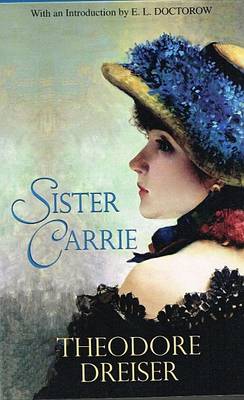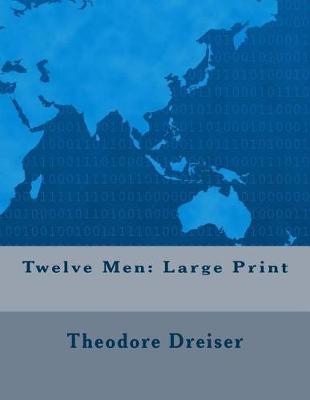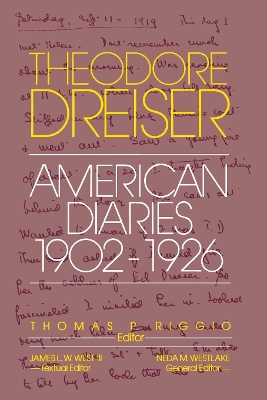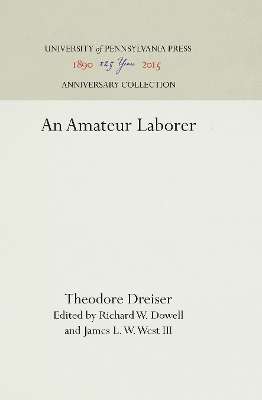The University of Pennsylvania Dreiser Edition
5 total works
Sister Carrie brought American literature into the twentieth century. This volume, which reprints the text Dreiser approved for publication during his lifetime and includes a special appendix discussing his earlier, unedited manuscript, is the original standard edition of one of the great masterpieces of literary realism.
Although world-famous for his novels Sister Carrie and Jennie Gerhardt, Theodore Dreiser was also highly accomplished in journalism, autobiography, and travel writing. In 1919, having recently accepted the publishing contract of a new publisher, Boni and Liveright, Dreiser proposed to publish a "book of characters" that would collect twelve...
Read moreAlthough world-famous for his novels Sister Carrie and Jennie Gerhardt, Theodore Dreiser was also highly accomplished in journalism, autobiography, and travel writing. In 1919, having recently accepted the publishing contract of a new publisher, Boni and Liveright, Dreiser proposed to publish a "book of characters" that would collect twelve biographical sketches of individuals who were major influences on Dreiser, both as a man and as a writer. The resulting narratives combine the best attributes of the character sketch, the autobiography, and the short story into miniature masterpieces of prose.
The men profiled in Twelve Men are a diverse and colorful group: from Dreiser's equally famous brother, the songwriter Paul Dresser ("My Brother Paul"), to the entirely obscure railroad foreman Michael Burke ("The Mighty Rourke"), on whose work crew Dreiser had labored in 1903. The twelve narratives are compelling portraits of the men portrayed, but they also reveal many insights into Dreiser's own life and work. These factors elevate the significance of Twelve Men to a level consistent with other major works in the Dreiser canon.
Dreiser's careful preservation of his papers bears new fruit with the publication of his personal diaries for the years 1902-26. This volume presents all seven of Dreiser's hitherto unpublished American diaries, the intermittent journals he kept during the most productive years of his literary career. Together they constitute a...
Read moreDreiser's careful preservation of his papers bears new fruit with the publication of his personal diaries for the years 1902-26. This volume presents all seven of Dreiser's hitherto unpublished American diaries, the intermittent journals he kept during the most productive years of his literary career. Together they constitute a revealing self-portrait as well as a valuable commentary on the American scene during the first quarter of the twentieth century. They offer reflections on turn-of-the-century Philadelphia, the American South and Mid-West, Greenwich Village of the nineteen-teens, and Hollywood of the twenties. The diaries begin in 1902, when Dreiser was at a low point after the "suppression" of Sister Carrie, and continue until 1926, when he was enjoying the greatest success of his career with An American Tragedy.
This publication constitutes in its entirety a new source for biographical and critical study. This is particularly true of the diaries covering Dreiser's experience in Philadelphia, Greenwich Village, and with Helen Richardson—all of which were not available to previous biographers. The present Introduction by Professor Riggio is the first biographical narrative to make use of these materials. Future biographers will now be able to speak with more assurance of Dreiser's whereabouts, the people he knew, what he was reading, which writings were in progress, and of his fascinating private affairs in general. In addition, these diaries will be of interest to students of Dreiser's literary art, as they reveal subtle aspects of how Dreiser viewed the external world and transmuted it in his daily creative efforts.
This book is a volume in the Penn Press Anniversary Collection. To mark its 125th anniversary in 2015, the University of Pennsylvania Press rereleased more than 1,100 titles from Penn Press's distinguished backlist from 1899-1999 that had fallen out of print. Spanning an entire century, the Anniversary Collection offers...
Read moreThis book is a volume in the Penn Press Anniversary Collection. To mark its 125th anniversary in 2015, the University of Pennsylvania Press rereleased more than 1,100 titles from Penn Press's distinguished backlist from 1899-1999 that had fallen out of print. Spanning an entire century, the Anniversary Collection offers peer-reviewed scholarship in a wide range of subject areas.




